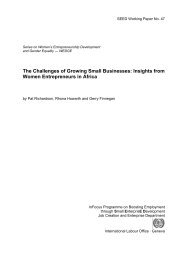manual: women workers' rights and gender equality - International ...
manual: women workers' rights and gender equality - International ...
manual: women workers' rights and gender equality - International ...
You also want an ePaper? Increase the reach of your titles
YUMPU automatically turns print PDFs into web optimized ePapers that Google loves.
<strong>International</strong> Labour St<strong>and</strong>ards: a set of conventions <strong>and</strong> recommendations, which constitute<br />
the normative context of ILO action concerning <strong>women</strong> <strong>and</strong> men workers.<br />
Declarations <strong>and</strong> Resolutions: concerning ILO <strong>gender</strong>-specific action, which define the key<br />
areas to combat discrimination against <strong>women</strong> <strong>and</strong> the priority issues to be addressed by the ILO.<br />
<strong>International</strong> Labour St<strong>and</strong>ards<br />
Setting international labour st<strong>and</strong>ards has been one of the principal means of the ILO since its<br />
creation in 1919 to promote social justice in the world of work. The <strong>International</strong> Labour<br />
Conference adopts international labour st<strong>and</strong>ards, after consultation with all ILO’s member States.<br />
The conference is a tripartite body composed of government, employers’ <strong>and</strong> workers’ delegates.<br />
The conventions <strong>and</strong> recommendations cover practically all aspects of human labour: employment,<br />
conditions of work, social security, industrial relations, safety <strong>and</strong> health, equal opportunities, nondiscrimination<br />
<strong>and</strong> other workers’ <strong>rights</strong>. As of July 2000, there are 183 conventions <strong>and</strong> 193<br />
recommendations.<br />
Conventions:<br />
• <strong>International</strong> treaties with binding power<br />
• Open to ratification by ILO member States<br />
• In ratifying a Convention, a State formally accepts the convention <strong>and</strong> is legally bound to apply<br />
it<br />
• The country will, if necessary, adopt new laws <strong>and</strong> regulations or modify the existing legislation<br />
<strong>and</strong> practice<br />
• The country must apply the convention not only in law, but also in practice<br />
Recommendations:<br />
• Not open to ratification<br />
• Lay down general or technical guidelines to be applied within countries<br />
• Often supplement conventions<br />
Four main ILO conventions that are crucial for <strong>gender</strong> <strong>equality</strong> promotion are:<br />
No. 100: Equal Remuneration Convention, 1951<br />
No. 111: Discrimination (Employment <strong>and</strong> Occupation), 1958<br />
No. 156: Workers with Family Responsibilities, 1981<br />
No. 183: Maternity Protection, 2000<br />
Declarations <strong>and</strong> Resolutions<br />
Other policy instruments are declarations <strong>and</strong> resolutions. The Declaration of Philadelphia,<br />
adopted during the <strong>International</strong> Labour Conference held in 1944 in Philadelphia, USA redefined<br />
the aims <strong>and</strong> purposes of the ILO. This Declaration includes the following principles:<br />
• Labour is not a commodity<br />
• Freedom of expression <strong>and</strong> of association is essential to sustained progress<br />
• Poverty anywhere constitutes a danger to prosperity everywhere<br />
• All human beings, whatever their race, creed or sex, have the right to pursue both their material<br />
well-being <strong>and</strong> their spiritual development in conditions of freedom <strong>and</strong> dignity, of economic<br />
security <strong>and</strong> equal opportunity<br />
161

















